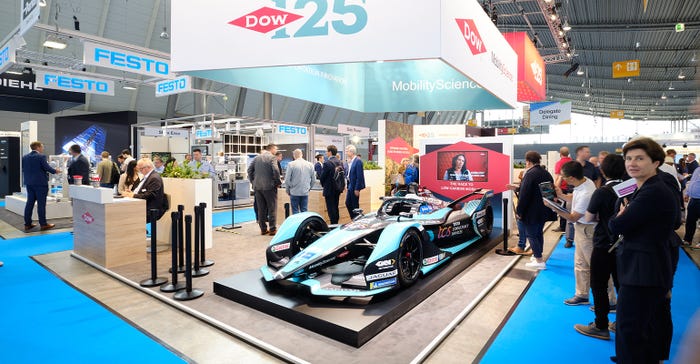AI Drives More Efficient EV Battery Testing
Preview: Monolith AI founder Richard Ahlfeld shares real-world results and best practices at The Battery Show Europe 2024.
May 22, 2024

With the potential uses of AI dominating conversation across every industry imaginable, it makes perfect sense that AI-driven models are informing the design of safer, more reliable electric vehicle batteries.
That’s what Richard Ahlfeld, CEO and Founder of London-based Monolith AI, will discuss in his presentation on June 20 at The Battery Show Europe in Stuttgart.
AI can be a pivotal asset, Ahlfeld told Battery Technology, as testing batteries to improve range and charging times continues to challenge battery engineers throughout the development process. To navigate this balancing act, Ahlfeld said, engineers “need confidence in the test coverage and long-term quality of the battery, but also face pressures to bring products to market quickly.”
While battery performance is difficult to simulate and unpredictable due to their electrical-chemical-thermal characteristics, “we see AI as the next wave of digital technology that enables and enhances the engineering process, in the same way that CAD-based design and simulation revolutionized design engineering, becoming mainstream in the 1980s and 1990s—powered by the rise of the desktop computer,” he explained.
“Similarly, AI and machine learning are in the early stages of engineering adoption, showing promise to accelerate product development on a broad scale.
The challenge; the solution
Carmakers must understand how batteries perform under many different conditions over time, Ahlfeld noted, requiring hundreds of hours of testing to ensure safety and performance—and avoid warranty issues later.
“On the flip side,” he added, “overtesting takes up valuable time and resources in the development schedule, which can needlessly delay new vehicle introductions and give competitors an advantage in the market. Technology is moving at great speed, and automotive is a highly competitive landscape. The shift to electrification has opened the door for startups in the battery and automotive markets to disrupt incumbents and change market dynamics.”
That need for speed is leading to the scaling up of AI technology to tackle this critical shift. Many companies realize they are behind and much pick up the pace.
“The uptake should continue to accelerate based on what we are seeing and hearing from engineering decision-makers,” Ahlfeld said. “They value the benefits that AI can bring to their organization. According to a recent study from Forrester Consulting, nearly two-thirds of automotive leaders expect AI’s potential impact to be extremely or very significant, while more than half say that adopting new AI technologies is crucial for staying competitive in the EV battery market.”

Monolith AI dashboard. MONOLITH AI
That said, it can be hard to convince engineers who are under pressure to get products to market to commit to learning how AI can help them do their jobs.
Battery engineers “are so busy, and the development process so complex, that introducing a new tool can be perceived as risky. Yet, we’re finding that battery makers are open to working with us because they’re spending so much time and money on testing, and just not sure if they’re doing enough or testing the right things. At the same time, the pressure to get to market requires them to move faster than ever before. They can make errors that cost them months if they don’t figure it out quickly. AI gives them confidence that they’re testing the right amount and helps find issues in their test data faster.”
Real-world successes
Monolith, a pioneer in deploying data-driven, AI-guided battery testing, has seen machine learning (ML) improve test plan efficiency by up to 73%.
“The opportunity for AI and machine learning in testing is to create more efficient test plans based on the predictive power of models,” Ahlfeld said. “Instead of creating a comprehensive test plan up front, engineers can apply an active learning methodology, using AI models to guide test plans as they go.
“The improvement is from taking the guesswork out of testing strategy. With ML models, battery engineers can find the best set of test conditions that cover the battery design space for the most critical conditions.”
After working on more than 300 AI projects with its engineering customers to get new designs to market faster, “the biggest opportunity is in validation testing of highly complex, dynamic systems with non-linear behavior, i.e. electric vehicle batteries,” Ahlfeld said.
Best practices emerging
Given the evidence thus far that AI is improving battery testing, Ahlfeld will share how AI:
Efficiently identifies optimal performance parameters.
Eliminates the need for extensive trial-and-error processes.
Expedites breakthroughs to the market.
Can be leveraged to provide a decisive advantage in the competitive EV market.
In fact, Monolith is investigating opportunities to leverage data from different battery designs to give engineers insights into how different compositions behave.
“We have developed algorithms that transfer learning across different compositions, enabling you to reuse existing models to predict how new designs perform. You can move much faster because you don’t have to collect so much new data as you go, but rather learn from the test data you already have.”
As developers continually adjust designs and materials to make their products perform better, they “are forced to acquire new test data to understand and validate battery performance.” Monolith provides interactive tools give developers more comprehensive insights into battery designs, and how they will react under different conditions.
“Self-learning models built using test data can be more accurate than ECM models and less complex to implement than P2D models when trying to predict battery performance,” Ahlfeld concluded.
Ahlfeld will deliver his presentation “Safer, more reliable batteries—faster: expediting battery development with AI-guided testing” at the Battery Show Europe, which runs from June 18-20.
About the Author(s)
You May Also Like





